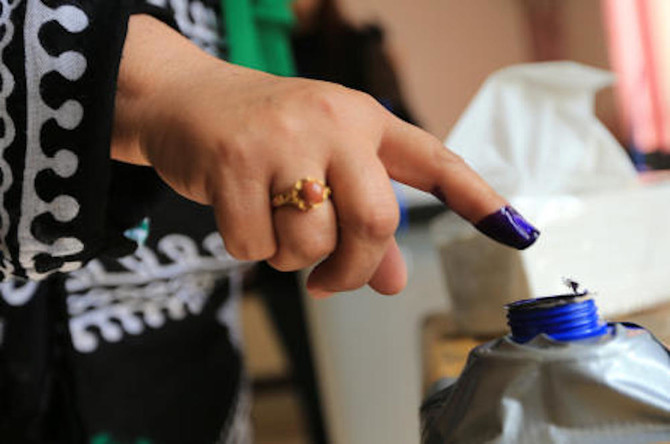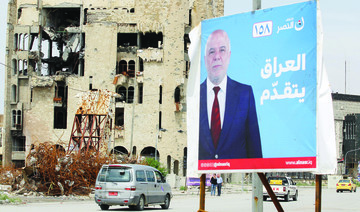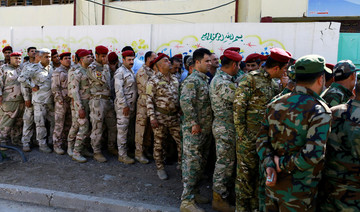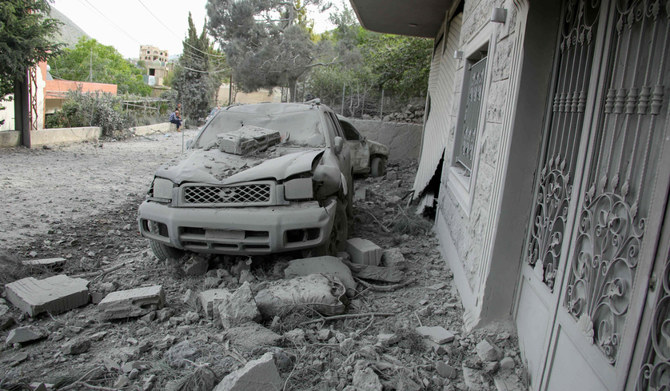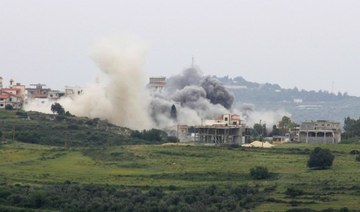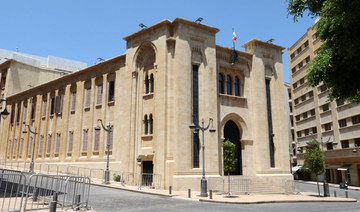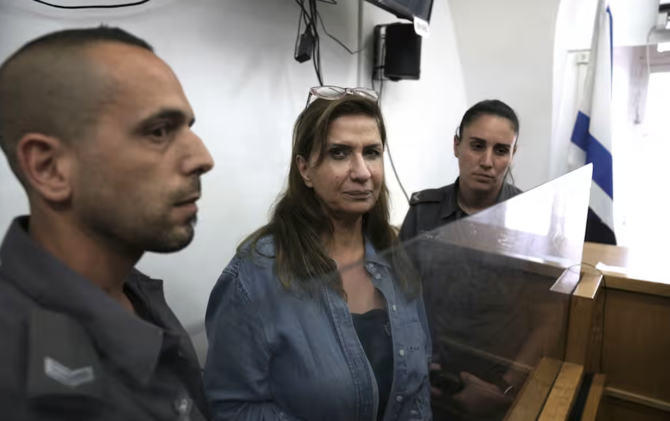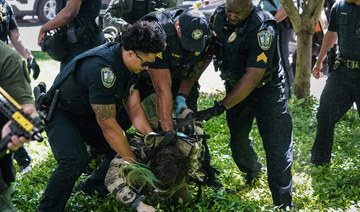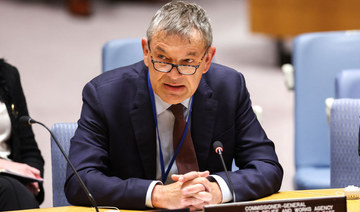BAGHDAD: Iraqis voted in the first election on Saturday since defeating Daesh, but few people expect its new leaders to stabilize a country beset by conflicts, economic hardship and corruption since the fall of Saddam Hussein in 2003.
Depending on the outcome, the poll could bolster Iran's role in Iraq and the Middle East.
LATEST
11:30 pm GMT
The governor of Iraq’s Kirkuk province declared a curfew on Saturday and ordered a manual recount of votes there in the national election, saying an electronic counting system had produced an “illogical” result.
Rakan Al-Jubouri, governor of the northern oil-rich region, announced a curfew from midnight until 6 a.m. (0300 GMT) to prevent any ethnic or sectarian tension between its Kurdish, Arab and ethnic Turkmen communities.
Al-Jubouri did not elaborate in his statement on the problem with the vote-counting system.
In October, Iraqi forces backed by Shiite militias dislodged Kurdish Peshmerga fighters who had taken control of Kirkuk city in 2014, preventing its capture by Daesh militants who had overrun Iraqi army positions in northern and western Iraq.
The return of the Iraqi army to Kirkuk was greeted with relief by the Arab and Turkmen populations there.
Saturday’s elections are the first in Iraq since the defeat of Daesh last year by Iraqi forces backed by a US-led coalition.
8:02 pm GMT
The Independent High Electoral Commission overseeing Iraq's election releases initial results, saying total voters amounted to 10.7 million with voter turnout exceeding 44.5 percent.
It explained that the latest technology was used in the electoral process and the commission would examine all complaints and take appropriate action for each case.
The election commission denied rumors spread through the media and said allegations of tampering and falsifying were unfounded, adding that all the ballots will be sent for verification on Sunday.
It also added that there are some parties that intend to undermine the ballot and manipulate Iraqi public opinion.
6:26 pm GMT
The United States emphasized the importance of forming an “inclusive” Iraqi government as it congratulated the country on its first parliamentary election since declaring victory over the Daesh group.
The newly elected members of Iraq’s parliament “will have the important task of forming an inclusive government, responsive to the needs of all Iraqis,” read a statement by Secretary of State Mike Pompeo.
“We hope this process moves quickly, and on the constitutional timeline, so that Iraq can continue moving toward a more secure, prosperous and brighter future,” he said.
Pompeo noted that Iraqi citizens “from every ethnic and religious group, and from all 18 provinces, including those internally displaced, made their voices heard.”
He added that Washington “stands ready to partner with Iraqi leaders as we continue to build a long-term relationship of cooperation and friendship between our two nations” that will “contribute to stability in the region and growing peace and prosperity in Iraq.”
The Iraqi vote comes with tensions surging between Iran and the United States after Washington pulled out of a landmark 2015 nuclear deal, sparking fears of a destabilizing power struggle in Iraq.
4:58 pm GMT
Three men were killed by a bomb attached to their car in a Sunni Arab region south of the oil city of Kirkuk on Saturday in an attack which security sources linked to Iraq's parliamentary election.
Two of the dead were voters and the third an observer in a voting station near the town of Al-Khan, the sources said.
Daesh earlier claimed responsibility for the attack. The militants had threatened attacks in the runup to the vote, the first held since they were defeated last year by Iraqi security forces backed by a US-led coalition.
3:00 pm GMT
Polls have closed across Iraq at 6:00 pm local time (3:00 GMT) and the initial turnout percentages in every province is expected to be announced soon.
The Independent High Electoral Commission announced it will deliver some details by 7pm to announce some partial results.
For the first time in a post-2003 election, there were no attacks targeting the polling stations or the voters.
Iraqi Prime Minister Haider Al-Abadi said the security forces had succeeded in protecting the polling process.
Full results are expected within the next 48 hours according to the independent body that oversees Iraq's election, but negotiations to choose a prime minister tasked with forming a government are expected to drag on for months.
Polls have closed in Iraq's parliamentary elections. The results will be announced once the votes are counted and verified #IraqVotes #IraqiElections2018 pic.twitter.com/20tpN6GO49
— Government of Iraq (@IraqiGovt) May 12, 2018
Upon the poll closures, the Iraqi governmnet immediately thanks the Iraqi voters, candidates and everyone involved in the electroal process on its official Twitter account.
The @IraqiGovt wishes to thank the candidates who stood for election, Iraqis who voted in the election, poll officials and the volunteers & observers whose dedication ensured the successful conduct of this milestone democratic achievement #IraqVotes #IraqiElections2018
— Government of Iraq (@IraqiGovt) May 12, 2018
Iraqi cleric Muqtada Al-Sadr also released a statement congratulating the Iraqi people and called on the political forces to exercise restraint.
1:37 pm GMT
The turnout in the Iraqi elections may not exceed 40 percent across the country, local observers told Arab News.
Despite the expectations that the turnout will increase in the evening and after the lifting of a transport curfew, many people in Baghdad have stayed home, reports Arab News correspondent Suadad Al-Salhy.
With two hours left until polls close, the turnout is still very low. On top of that, many people were not allowed to participate in the voting because they are either registered abroad or have not updated their electoral records.
______________
1:26 pm GMT
Suadad Al-Salhy from Baghdad: The number of teenagers who have begun dismantling the banners of the candidates, in order to reuse the materials, seem to outnumber others on the streets of Baghdad.
______________
11:43 am GMT
Mosques in the Sunni-dominated districts of the Iraqi capital have called through their loudspeakers for people to go out and vote.
Akram Hussein, a Shiite physician working in Baghdad, told Arab News that the poor turnout of Shiite voters so far was evidence that Shiite politicians have failed to secure the interests of their voters.
"Their attempts to urge voters to participate in the election has not produced any change yet,” he said. “Let we see whether the situation will change in the next two hours or not.”
The curfew imposed in all provinces on the movement of vehicles has been partially lifted.
______________
11:14 am GMT
Arab News correspondent in Baghdad Suadad Al-Salhy is reporting from polling stations across the city, including in the Shiite dominated Sadr City.
"Turnout in the Shiite dominated areas is very low so far in Baghdad so Shiite parties and candidates have been trying to encourage their people to vote," she said.
"Representatives of Ayatollah Ali Al Sistani and Muqtada Al-Sadr himself have voted in Najaf and their pictures were widely circulated to encourage people to follow them."
______________
10:36 am GMT
Iraqi Prime Minister Haider Al-Abadi has ordered the reopening of the nation’s airspace and resumption of air traffic, state television reported.
Commander-in-Chief @HaiderAlAbadi orders the reopening of Iraqi airspace & all of Iraq's airports for domestic and international aviation #IraqVotes #IraqiElections2018
— Government of Iraq (@IraqiGovt) May 12, 2018
______________
10:26 am GMT
An order is issued lifting restrictions on the movement of vehicles across Iraq:
Commander-in-Chief @HaiderAlAbadi orders lifting of restrictions on movement of vehicles across Iraq, but authorises local security forces to maintain or reimpose partial restrictions based on their assessment of the security needs of their areas #IraqVotes #IraqiElections2018
— Government of Iraq (@IraqiGovt) May 12, 2018
______________
09:06 am GMT
Prime Minister Haider Al-Abadi is searched as he arrives at a polling station to cast his vote in the parliamentary election:
السيد رئيس مجلس الوزراء الدكتور حيدر العبادي يدلي بصوته في احد مراكز الانتخاب( مدرسة بغداد) في منطقة الكرادة .https://t.co/Gv3BPkOvQy
— PM Media Office (@IraqiPMO) May 12, 2018
______________
READ MORE
Iraq faces a vote that will offer hope for the future — or leave it teetering on the brink
‘Stab in the back’ splits Iraq’s Shiites
Daesh attack kills security forces near Kirkuk on Iraq election day
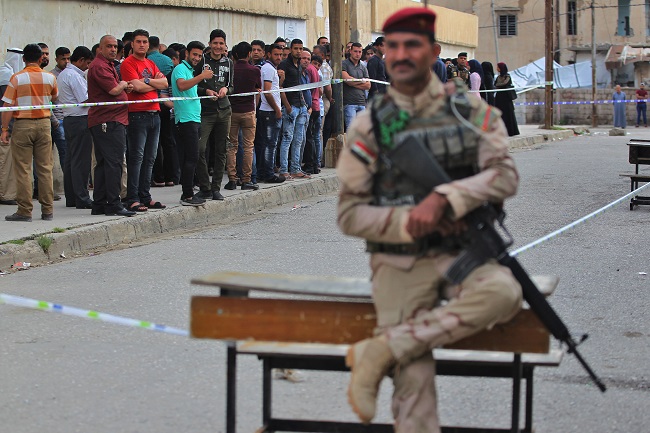
A member of the Iraqi security forces stands guard as people queue in front of a polling station in the Wadi Hajar district of Mosul on May 12, 2018. (AFP)
______________
EARLIER TODAY
The Supreme Security Committee for the Iraqi elections announced the arrest of a member of the Iran-backed Popular Mobilization Militia after firing shots at a polling station in the district of Baiji, Salahaddin province.
The Iraqi state television reported that "the Supreme Electoral Security Committee arrested one of the members of the popular mobilization militia after firing shots at an electoral center in Baiji district."
The Iraqi media gave no further details on the incident and the cause of the shooting, nor if there were any potential casualties.
The election's victors will have to contend with the fallout from US President Donald Trump's decision to pull out of the nuclear deal with Iran, a move that raised fears among Iraqis that their country will be a theatre of conflict between Washington and Tehran.
The three main ethnic and religious groups -- the majority Shiite Arabs and minority Sunni Arabs and Kurds -- have been at odds for decades, and sectarian divisions remain as deep as ever even though they joined forces to fight Daesh.
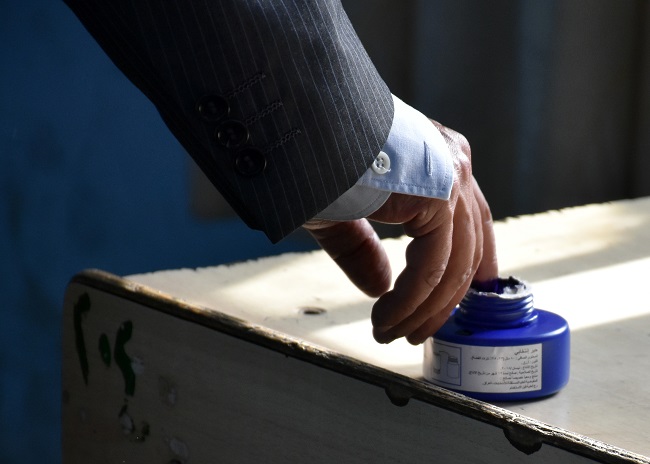
An Iraqi voter dips his index finger in ink at a poll station in the northern multi-ethnic city of Kirkuk on May 12, 2018. (AFP)
"I will participate but I will mark an 'X' on my ballot. There is no security, no jobs, no services. Candidates are just looking to line up their pockets, not to help people," said Jamal Mowasawi, a 61-year-old butcher.
The three main candidates for prime minister, all Shiites, are incumbent Haider al-Abadi, his predecessor Nuri al-Maliki and Shiite militia commander Hadi al-Amiri. All need the support of Iran, which has economic and military sway in Iraq as the primary Shi'ite power in the region.
Abadi is considered by analysts to be marginally ahead, but victory is far from certain for the man who raised hopes that he could forge unity when he came to office.
In office he reached out to minority Sunnis but alienated Kurds after crushing their bid for independence. He improved his standing with the victory against Daesh, which had occupied a third of Iraq.
But Abadi lacks charisma and has failed to improve the economy and tackle corruption. He also cannot rely solely on votes from his community as the Shi'ite voter base is unusually split this year. Instead, he is looking to draw support from other groups.
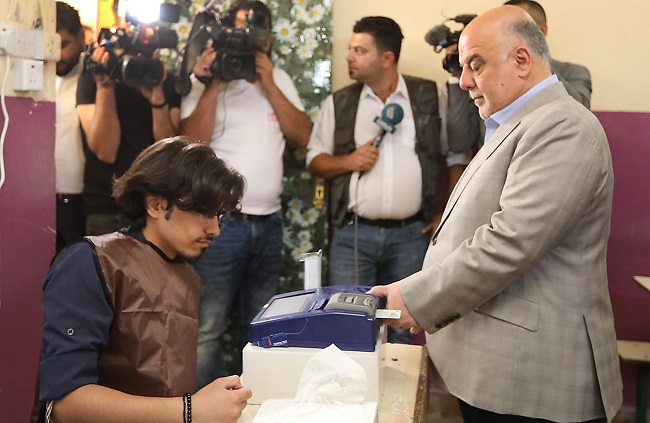
PM Haider al-Abadi arriving to register with his biometric voting card at a poll station in the capital Baghdad's Karrada district. (AFP)
Even if Abadi's Victory Alliance list wins the most seats, he still has to negotiate a coalition government, which must be formed within 90 days of the election.
Amiri, 63, spent more than two decades fighting Saddam from exile in Iran and leads the Badr Organisation, the backbone of the volunteer forces that fought Daesh. Victory for Amiri would be a win for Iran, which is locked in proxy wars for influence across the Middle East.
Disillusion
But many Iraqis are disillusioned with war heroes and politicians who have failed to restore state institutions and provide badly needed health and education services.
"There is no trust between the people and the governing class," said Hussein Fadel, a 42-year-old supermarket cashier in the capital. "All sides are terrible. I will not vote."
Some people expressed frustrations at technical problems which kept them from voting in Falluja, which used to support Saddam, was devastated by battles between US troops and insurgents during the occupation and is now far from recovering from the war against Daesh militants.
"I have to vote it's very important. My voice is going to waste. Are they telling me no election? Shall I just go home?," asked labourer Khalid Abd, 65.
Critics say Maliki's sectarian policies created an atmosphere that enabled Daesh to gain sympathy among some Sunnis as it swept across Iraq in 2014.
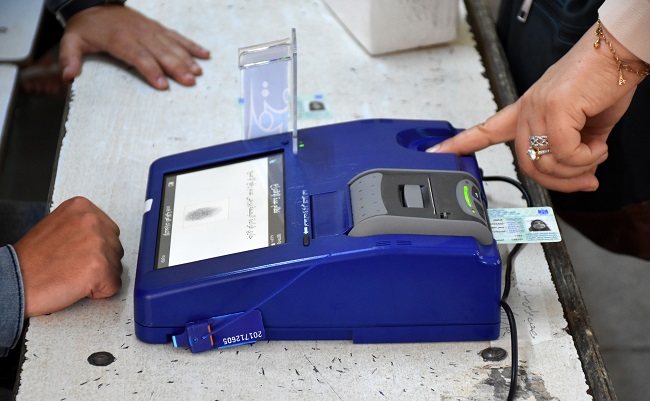
An Iraqi voter has her biometric voting card checked with her fingerprint upon arriving at a poll station in the northern multi-ethnic city of Kirkuk. (AFP)
Maliki was sidelined soon afterward, having been in office for eight years, but he is now trying to make a comeback. He is again posing as Iraq's Shiite champion, and has proposed doing away with the unofficial power-sharing model under which all main parties have cabinet representatives.
Maliki, who pushed for US troop withdrawals, and Amiri, who speaks fluent Farsi and spent years in exile in Iran during Saddam's time, are both seen as closer to Tehran than Abadi.
The post of prime minister has been reserved for a Shiite, the speaker of Parliament is a Sunni, and the ceremonial presidency has gone to a Kurd - all three chosen by Parliament.
More than 7,000 candidates in 18 provinces, or governorates, are running this year for 329 parliamentary seats. More than 24 million of Iraq's 37 million people are eligible to vote in the election, the fourth since Saddam's fall.
In Kirkuk, the main oil city disputed by Iraq's Kurds and the Baghdad government, 90-year-old Najm al-Azzawi has witnessed Iraq's upheaval over many years: Saddam's military adventures and the crippling international sanctions that followed, the US occupation, sectarian bloodshed and Daesh's reign of terror. But he has not lost hope.
"God save Iraqis from the darkness they have been in," he said. "It is the most joyful thing to vote."

















